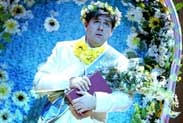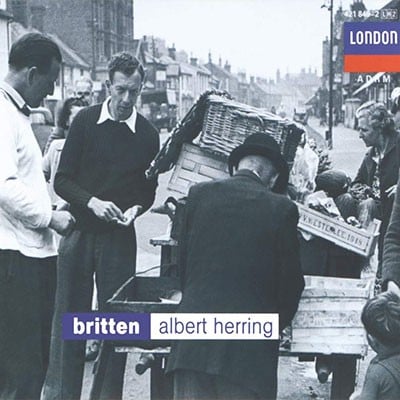OPERA SEARCH

Albert Herring
(1947)Libretto by Eric Crozier, freely adapted from a short story of Guy de Maupassant (E,Bg,F,Fl,Fn,G,H,I,P,Sw)
2S,2M,A,2T,2Bar,B; Children's roles:Tr,2S
1(=picc,afl).1.1(=bcl).1-1.0.0.0-perc(1):timp/SD/TD/BD/tgl/cyms/cast/
tamb/gong/bells/glsp/whip/wdbl-harp-pft(=conductor)-
strings(1.1.1.1.1)
Abbreviations (PDF)
Boosey & Hawkes
Glyndebourne
Frederick Ashton, director
Conductor: Benjamin Britten
Company: English Opera Group
| LADY BILLOWS, an elderly autocrat | Soprano |
| FLORENCE PIKE, her housekeeper | Contralto |
| MISS WORDSWORTH, head teacher | Soprano |
| MR GEDGE, the vicar | Baritone |
| MR UPFOLD, the Mayor | Tenor |
| SUPERINTENDENT BUDD | Bass |
| SID, a butcher's assistant | Baritone |
| ALBERT HERRING, from the greengrocers | Tenor |
| NANCY, from the bakery | Mezzo-Soprano |
| MRS HERRING, Albert's mother | Mezzo-Soprano |
| EMMIE | Soprano |
| CIS | Soprano |
| HARRY | Treble |
The small East Suffolk market town of Loxford, 1900
In a small Suffolk market town Mr Gedge the Vicar, Police Superintendent Budd, Mr Upfold the Mayor and the local head teacher Miss Wordsworth meet at the home of Lady Billows to appoint at her behest a May Queen as an encouragement to local chastity. As they review the list of possibles, Lady Billows's housekeeper Florence Pike, armed with reports of unworthy behaviour, condemns each and every one. Eventually none is left, and instead a May King is proposed and Albert Herring — blameless son of a widowed shopkeeper — is chosen. The group informs Albert and his mother at their shop — though the shy young man tries unsuccessfully to refuse. At the ceremony in a marquee in the vicarage garden, butcher's assistant Sid laces Albert's lemonade, so that his contribution to the occasion consists largely of hiccups and silence. Later, back in the shop, Albert casts envious glances at the affectionate relationship between Sid and his girlfriend Nancy and, armed with his prize money, sets off in search of a little adventure of his own.
By the following afternoon, concern is growing at his disappearance. The police are called in. Eventually the hasty villagers decide that he must have come to a bad end, and begin to mourn him. Up turns Albert, however, to face a telling off for going absent without leave and shocked reactions from his elders and betters when his carousing in public houses is revealed. Albert, of course, is unashamed, and celebrates his new-found independence by inviting three local kids into the greengrocers to share some peaches, tossing his May King's orange blossom wreath into the audience as a final gesture.
Britten’s second chamber opera was composed just a year after its predecessor, The Rape of Lucretia, in 1947. Yet the contrast in style and subject matter could not be greater: instead of a tragedy based on a tale from Roman antiquity, Albert Herring is a comic opera set in the imaginary East Suffolk town of Loxford at the turn of the 20th century. The score contains some of Britten’s wittiest musical invention and his gifts for parody and caricature, already evident in Peter Grimes, are given full reign. However, the work is far from being mere farce: Albert is a sympathetic and credible figure who, tied to his mother’s apron-strings and frustrated by small-town pieties, embarks on a debauched ‘rake’s progress’, a theme fully in keeping with the composer’s favourite subject of the loss of innocence.
Moreover, such poignant touches as the third-act Threnody, in which Albert, presumed dead, is solemnly mourned by the gathered townsfolk, makes Donald Mitchell’s description of the opera as ‘a serious comedy’ seem completely apt.
Reproduced by kind permission of the Britten-Pears Library
Comic

Peter Pears/Sylvia Fisher/Johanna Peters/John Noble/Owen Brannigan/English Chamber Orchestra/Benjamin Britten
Decca 421 8492

